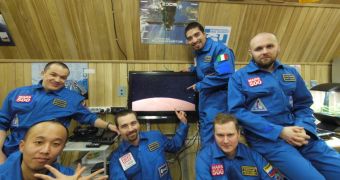The European Space Agency (ESA) is proud to announce that the Mars500 experiment, which is currently being carried out in the Russian Federation, will soon turn one. Six astronauts are locked together in a confined space, simulating a return journey to Mars.
As the name implies, the crew will spend a lot of time in space, about 520 days. The goal of the study is to determine whether a small crew, of around six astronauts, could withstand the rigors of traveling in tight confines for more than a year and a half until they reach the Red Planet.
The psychological component of such a long mission is critically important to the endeavor's success, experts say, and thus far the members of the team involved in Mars500 managed to “endure” each other's company for a little less than a year without noticeable incidents.
The experiment is being carried out in a series of modules placed in a hall at the Russian Institute for Biomedical Problems, on the outskirts of Moscow. Three Russians, two Europeans and a Chinese “astronaut” are involved in the research.
Mars500 simulates both the interactions and the psychological tolls that travel for such a long time take on the human mind. The mission has already reached Mars, spent a month there collecting evidence, and is now on its way back home.
The six astronauts are scheduled to complete their assignment sometime this November, ESA announces. Until then, the crew still needs to complete a few tests. This April, for example, they simulated a total communications blackout with the planet.
This is not at all unusual during space missions, as the Sun comes directly between a spacecraft and Earth. Radio signals are drowned out, and communications need to stop for days, sometimes weeks.
The thing about these so-called solar oppositions is that they can be predicted, and their exact length and span calculated. As such, mission controllers managing robots and manned spacecraft know when to expect them.
During the April blackout, the crew managed to “organize their life very well. Previous studies indicated that a period of high autonomy is not always stressful – it can be motivating,” ESA says.
“It was like a holiday from the tight control of every day, letting the crew make independent decisions. The break also helps researchers to understand the special psychology of the communication between Mission Control and the crew,” the same press release states.

 14 DAY TRIAL //
14 DAY TRIAL //